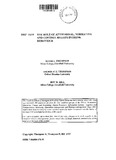- CERES Home
- →
- School of Management (SoM)
- →
- SoM Working and Occasional Papers
- →
- View Item
JavaScript is disabled for your browser. Some features of this site may not work without it.
| dc.contributor.author | Thompson, Keith E. | |
| dc.contributor.author | Thompson, Nicholas J. | |
| dc.contributor.author | Hill, Roy W. | |
| dc.date.accessioned | 2008-08-06T15:04:17Z | |
| dc.date.available | 2008-08-06T15:04:17Z | |
| dc.date.issued | 1995 | |
| dc.identifier.isbn | 1 85905 076 X | |
| dc.identifier.uri | http://hdl.handle.net/1826/2838 | |
| dc.description.abstract | Between 1985 and 1990 consumption of low alcohol and alcohol free beer grew at an annual rate of 100%. Yet expectations of a large and expanding market into 1990's were not fulfilled, partly because of economic downturn. As the economy recovers some brewers are anticipating renewed growth. This paper reports an application of reasoned action theory to the roles of attitudes, norms, behavioural control and habit in predicting behavourial intention in respect of alcohol free beer, in the very different market environment of the 1990's. Data were collected by means of a questionnaire posted to 400 households, yielding 78 usable responses. Unexpectedly, not getting drunk was not found to be an important predictor of intention. instead, behavioural intention was chiefly determined by beliefs concerning taste and health. Normative influences, especailly friends for non-users, family for users, were secondary predictors. Neither perceived behavioural control or habit were found to add to the predicitive power of the model. Some suggestions for the practical application of the findings are made. | en_UK |
| dc.language.iso | en | en_UK |
| dc.publisher | Cranfield School of Mangement | en_UK |
| dc.relation.ispartofseries | School of Mangement Working Papers; 16/95 | en_UK |
| dc.relation.ispartofseries | SWP; 16/95 | en_UK |
| dc.title | The role of attitudinal, normative and control beliefs in drink choice behaviour | en_UK |
| dc.type | Working Paper | en_UK |
